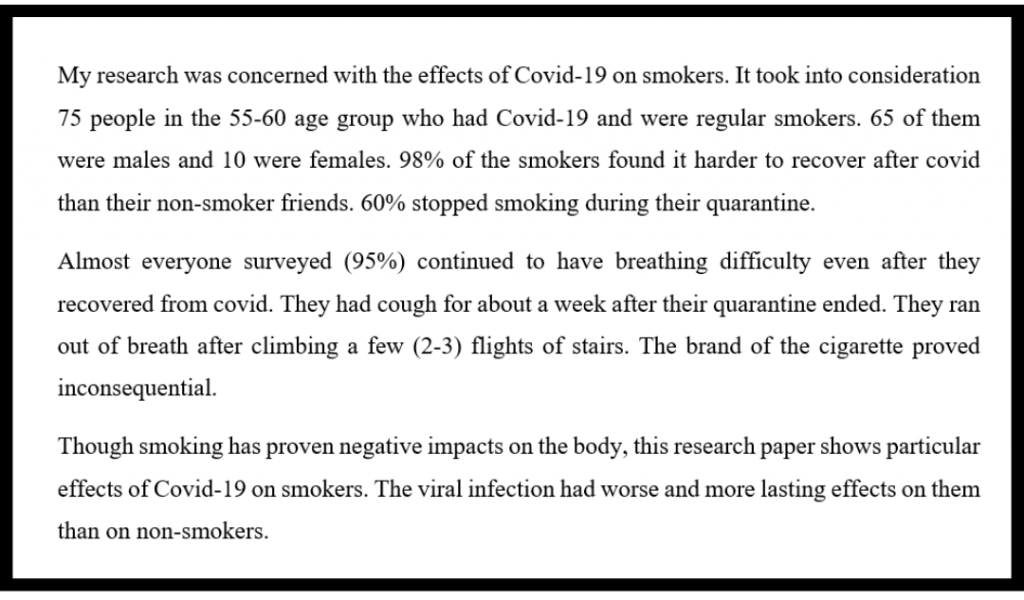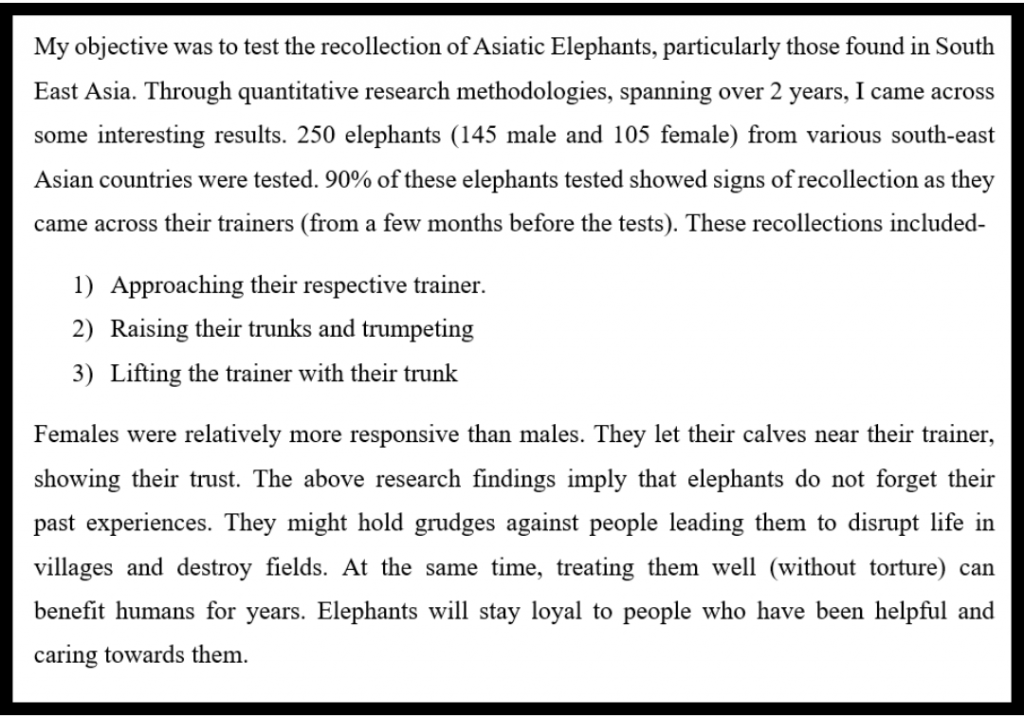Table of Contents
Introduction
As you start your process of writing a dissertation, the dissertation formatting needs to be kept in mind.Though a conclusion comes at the very end of a dissertation or research paper, it is extremely important. It is supposed to convey what you have deduced from your research. Its crispness needs to include only what is relevant to your problem statement or dissertation questions.
Write an appropriate dissertation conclusion relative to the size of your dissertation or thesis. The length of your conclusion should not be more than 5–7% of your total dissertation word count.
Dissertation Conclusion Tips
Here are a few dissertation conclusion tips to help you write a good conclusion. Make sure to go through them before you begin writing your dissertation conclusion. Make the necessary changes if you have already written a conclusion:
1. Make the conclusion short and impactful
Avoid making the dissertation conclusion too long. Make it precise and to the point. The more objective the conclusion, the better your dissertation will appear.
The purpose of a conclusion is to sum up all that has been learned through the process of writing a dissertation. Just as an introduction would contain the point or purpose of a dissertation or thesis, the conclusion needs to sum up the findings that have become evident from the observations and analysis.
2. Do not include a detailed explanation in your conclusion
While writing a conclusion, remember that the reader is not interested in reading a detailed analysis as your conclusion. You will appear confused about the structure of your own dissertation. So, do not go on and on about the reasons behind your conclusions. You have already stated them earlier in your dissertation.
Your conclusion should make sweeping statements that cover your research well. They need not be followed by explanations, as that would be included in your analysis itself.
3. Use bullet points
You must be familiar with the aesthetic appeal of bullet points to a reader. Instead of long paragraphs, one prefers to read precise points. They are easier to go through over and over again and revise if needed.
They give the impression that the writer has a lucid purpose behind conducting their research and knows what they are doing. Use pointers in your conclusion as well. State your findings step by step, in a logical order. The points should be one-line summaries of your dissertation.
4. State and answer your Research question
As you begin writing your conclusion, try to restate your research question and then move on to answering it. Answers to the research questions addressed in the dissertation need to be stated clearly in the conclusion.
For example, you can begin your conclusion with ‘In this research paper, I tried to find out whether herbivorous animals have a color preference in the leaves they eat’.
Do not bring in new research questions in your conclusion. This will take the reader by surprise and lead to your research paper being all over the place.
5. You are allowed to reflect on your research
Every research paper has positive and/or negative observations and results. You could state whether your research was helpful in answering your research question. The aim you had in mind might have led you to your findings, which could be in your favor or not.
State whether they were good, bad, or ugly. Say whether your research was beneficial to you. Were there any personal conclusions? You might also state any surprising insights you come across in the process of working on your dissertation. While doing so, do not focus on the inclusion of your feelings while working on the dissertation. Eg, this research made me so happy.
6. Check out a few dissertation conclusion examples
Before you start writing your conclusion, read a few dissertation conclusion examples online. You can refer to a few available online or read some research papers to get a clearer idea of dissertation conclusions. You can ask your professor or advisor for a few examples as well, in order to get an idea of what they are expecting from you. The format will guide you as you work on your dissertation.
7. Go through your dissertation
As you begin writing your conclusion, it would be beneficial to go through your dissertation or research paper one more time. Evaluate the contents of your dissertation. You might find useful points to include in your conclusion. Those might have been left out while you were writing the conclusion. However, do not include new information in your conclusion while doing so. All points that you state in your dissertation conclusion should have been previously proven in your research paper or dissertation.
8. Give references
It is crucial to reference other articles related to your dissertation or response paper. It will establish you as a thorough researcher. This can be done throughout the dissertation and in the dissertation conclusion.
Cite sources of information and give credit to whoever has been of help in conducting your research and writing a dissertation. At the same time, you can state the anomalies you found while referencing a paper for your research. Assert how your dissertation disproves a pre-existing hypothesis or says more about a phenomenon mentioned in another research paper.
9. Highlight important phrases
A reader should be able to see your conclusions at a glance. In order to quote your findings, it is important that you highlight the main points that you are making in your dissertation conclusion.
Highlighting will help a reader come back to important points later. They will know what is to be focused on and kept in mind while reading your dissertation. The keywords can be highlighted as well. They will help catalog your dissertation among other research papers that might be related to your field of study. This will help with further referencing.
10. State the importance of your dissertation for future research
The implications of your research paper or dissertation can be numerous. The dissertation can be a significant step in the respective field, which can change humankind’s perspective and method of solving global problems.
The reader should see value in your research paper. They should feel your dissertation is worth thinking about and important enough for you to work on. Personal motivations (the dissertation only being of help to you) to conduct research and analysis might not be enough while stating the implications of your dissertation. In order to convince a reader of the importance of your findings, it is crucial that you believe in your findings and research.
Dissertation Conclusion Checklist
A step-by-step dissertation conclusion checklist for you will be:
- Have bullet points, not long paragraphs.
- State your research question and answer clearly.
- Sum up your research findings in a few words.
- Reference pre-existing papers.
- Do not explain points unnecessarily.
- State your responses to your research and dissertation.
- Go through your dissertation once again and find out important points; check if you have included them in your conclusion.
- Highlight the main phrases in your dissertation conclusion.
Dissertation Conclusion Samples
To Sum Up
In essence, as you delve into the intricacies of your dissertation, don’t underestimate the significance of proper formatting. The conclusion, despite its position at the end, carries substantial weight as it encapsulates the derived insights from your research. Crafting an impactful conclusion involves maintaining brevity, utilizing bullet points for clarity, and ensuring it adheres to the recommended word count range.
Additionally, restating and answering your research question, offering reflections on your findings, and highlighting key phrases for emphasis are crucial elements. Drawing inspiration from dissertation conclusion examples, conducting a thorough review of your dissertation, ensuring proper referencing, and emphasizing the research’s future implications are key steps in this process. Consider incorporating the expertise of dissertation editing services platforms like TrueEditors, WriteSmartly, ProofreadingPal, Kibin, as they have skilled dissertation editors who specialize in refining grammar, enhancing structural coherence, and elevating the overall quality of dissertations. Their adept editors bring valuable insights to ensure a polished and professional final product for your academic work. You are good to go!
-Masha Evans



